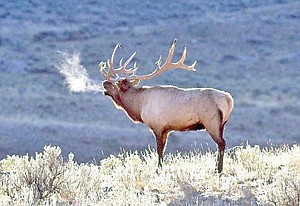Hunter: Wolves mean less big game
Phil Johnson | Hagadone News Network | UPDATED 12 years, 1 month AGO
Don Wilkins, 62, fears his generation of hunters has seen the best hunting in the history of Montana.
A man who once “lived to hunt,” Wilkins has not bought a single license in four years. The elk don’t bugle like they used to. He walked Wolf Creek for two weeks last year with a group of hunters and didn’t see so much as fresh tracks. He only saw four wolves.
More than anything, Wilkins blames his empty hunts on the impact wolves have had on big game animals. He points to the recent removal of six wolves from the Lynch Lake area after livestock depredation as evidence of Montana Fish, Wildlife & Parks’ inability to control the wolves.
“I’m concerned the younger generation of hunters will lose interest because of unsuccessful hunts,’ Wilkins said.
Kent Laudon, a wolf biologist for Montana Fish, Wildlife & Parks, finds Wilkins’ blame misguided. He calls the growing wolf population, and the impact it has on big game, complex and fluid.
“I think this is a situation where perception is trumping reality,” Laudon said.
The Montana wolf population has steadily increased since 2005. Minimum wolf counts are conducted every year and approximately 660 were recorded at the end of 2012.
The growth of the gray wolf population, from an extirpated animal to endangered to delisted in 2011, has been a polarizing topic.
According to Laudon, Canadian gray wolves began ranging into the United States in the late ’70s. In 1986, the first wolf den in the western United States in more than 50 years was documented in Glacier National Park.
The 1995 reintroduction of wolves into Yellowstone National Park made national headlines. The move was met with contention from farmers concerned for their livestock as well as biologists concerned about the introduction of wolves into areas already habituated by other wolves.
On top of his concern about hunting impact, Wilkins says he’s waiting for the day he hears of an eastern Montana farmer waking to dozens of dropped cattle.
This year, Montana Fish, Wildlife & Parks has acknowledged 51 confirmed cattle kills, 15 probable cattle kills and five injured livestock. The agency has confirmed 24 sheep kills.
Laudon says concerns about livestock predation are overblown, but also sees what he calls “curious avoidance” by wolves that live around livestock. The August death of 176 sheep at an Idaho farm is highly unusual, and most of the sheep died from suffocation when the herd panicked during a wolf attack and stampeded each other.
Farmers are allowed to shoot and kill wolves found preying on Montana livestock. Three landowners have successfully done so this year. The U.S. Fish & Wildlife Service has killed 67 more wolves.
Last year, hunters and trappers claimed 225 wolves. The general rifle season opened Sept. 15 and runs through March 15. A wolf license is $19.
The Montana Livestock Loss Reduction & Mitigation Board and Program reimburses farmers for the loss of livestock that, according to the board, “will continue to result in the loss of personal property and income to some livestock producers.”
Laudon finds similar overstatement on claims of sport killing and wolves’ impact on hunting.
“There is a difference between compensatory and additive mortality,” Laudon said. “In the winter, wolves are often making compensatory kills, which are animals that would naturally die, anyway. Additive kills are in addition to the animals that would die naturally. There would have to be enough of those to make a visible difference in the field.”
Wilkins says he has seen that difference. He feels disenfranchised by Montana Fish, Wildlife & Parks, saying nothing is considered official until someone in the agency sees it themselves, regardless of how well informed and aware Montana’s population of hunters may be.
“Science works in large time scales,” Laudon said. “Some people only care about what is going on right now in their back yard.”
ARTICLES BY PHIL JOHNSON

Mountain pleads not guilty to seven Yaak burglary charges
Not guilty, seven times over. That was the plea Monday when Zachary Michael Mountain, 19, was arraigned before District Judge James Wheelis. Mountain faces as many as 140 years in prison for his alleged involvement last year in a string of felony burglaries in the Yaak.

Hunters look forward to general season

Crace runs toward state rushing lead
Libby's conference leading rusher puts team on his back
Announcing Libby Loggers football games this year is a predictable endeavor. With the passing game aching from the absence of graduated All-State quarterback Jared Winslow, the Loggers are a committed ground team. Reminiscent of the era when offenses were pleased with three yards and a cloud of dust, the Loggers run game repeatedly rams the ball right into the teeth of the opposing defense.

